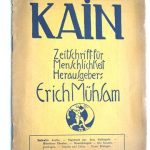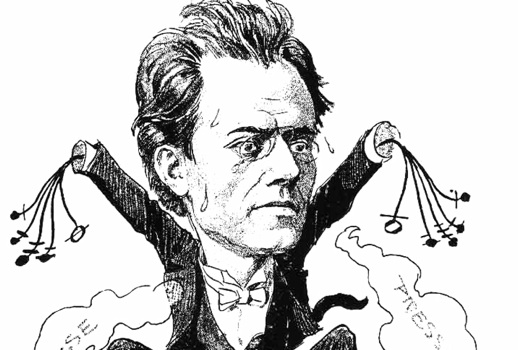Breton – Mühsam – Heine – Rückert – Celan – Tagore
E l v e r b o s e r
En general, conozco la desesperación: no tiene alas, ni tiene por qué detenerse ante una mesa de terraza al atardecer, frente al mar. Es la desesperación, no es el regreso de cierta cantidad de hechos insignificantes como granos de arena que huyen de la noche y se van dando saltos, de surco en surco. No es de cartón piedra ni es un vaso para beber. Es un barco acribillado por la nieve, un pájaro que muere en el aire. Su sangre no tiene el más mínimo espesor. Conozco, a grandes rasgos, la desesperación. Su forma es diminuta, es una joya hecha con cabello. Es la desesperación. Es un collar de perlas, imposible de cerrar. Ni siquiera pende de un hilo, eso es la desesperación. De lo demás, ni hablar. Si comenzamos no acabamos nunca de desesperar. Yo me desespero con las persianas, a eso de las cuatro de la tarde, con un abanico, a medianoche; me desesperan los cigarrillos de los condenados a muerte. Conozco la desesperación y sus lineamientos generales. No tiene corazón, se queda siempre en la mano, sin aliento, la desesperación, la desesperación, su hielo no nos dice jamás si está muerta. Vivo con desesperación, ella me fascina. Amo la mosca azul que sobrevuela las horas cuando cantan las estrellas. Conozco a grandes rasgos la desesperación, su aturdimiento de granizo, ese orgullo desesperante, esa cólera desesperada. Me levanto todos los días como todo el mundo, estiro los brazos contra el papel estampado de flores, no recuerdo nada. La desesperación me hace recordar los bellísimos árboles que arranca de raíz la noche. El aire de mi pieza es bello como el redoble de un tambor. Vivo en el mejor de los mundos, conozco la desesperación, sus lineamientos generales. Es como si el viento pusiera un artilugio mecánico al atravesar las cortinas. ¡Será posible, tanta desesperación! ¡Hay que apagar el fuego! Ya vienen… ya llegan los carteles del canal, los anuncios luminosos. ¡Arena, puñados de arena! En sus lineamientos generales, la desesperación no tiene ninguna importancia. Es un conjunto de árboles que serán algún día un bosque, estrellas que dejarán de existir un día antes, unos pocos días de lo que, algún día, será mi vida.
Versión original: https://www.poesie.net/breton.htm – Traducción de Andrés Unger
Una excelente presentación de André Breton: https://www.andrebreton.fr/fr/andre_breton#
* * *
Erich Mühsam (1878 – 1934)
 Poeta, dramaturgo y periodista berlinés; murió asesinado por los nazis en el campo de concentración de Oranienburg. Fue anarquista, pacifista, agitador político y editor de las revistas satíricas Kain (Caín) y Fanal.
Poeta, dramaturgo y periodista berlinés; murió asesinado por los nazis en el campo de concentración de Oranienburg. Fue anarquista, pacifista, agitador político y editor de las revistas satíricas Kain (Caín) y Fanal.
LIEBESWEH
Zähre rieselt mir um Zähre
in des Betts zerwühltes Laken.
Bange Angstgedanken haken
sich in meiner Seele Schwere.
Schmerzgekrümmt sind meine Beine;
traurig triefend hängt der Bart
von den Tränen, die ich weine –
und die Nase trieft apart …
Ach, es ist der Traum der Liebe,
den ich durch die Seele siebe.
Ach, es ist der Liebe Weh,
die mich zwickt vom Kopf zum Zeh. –
Armes Herz! Die Träume wittern
fernen Trost. Ich spann’ die Ohren –
und durch meiner Seele Zittern,
fernherflüsternd, traumverloren,
murmelt ein geliebter Mund:
Schlapper Hund!
ERICH MÜHSAM 1878 – 1934, ermordet im KZ Oranienburg), dt. Schriftsteller, Anarchist und Pazifist, Hg. der Zeitschriften “Kain” und “Fanal”. LIEBESWEH
Mal de amor
El llanto cae sobre más llanto
en las sábanas deshechas en mi cama.
La congoja me atenaza con retorcidos
pensamientos que se me clavan en el alma.
Tengo las piernas arqueadas por el dolor,
las barbas me cuelgan mojadas
por las lágrimas que fluyen
y la nariz me chorrea horriblemente…
Son sueños de amor
que voy filtrando en el alma.
¡Ay, las agonías del amor,
que me perforan la anatomía!
Pobre corazón, ¡en sueños ya intuyes
el lejano consuelo! Afino el oído:
en el alma titilan, a lo lejos,
suaves, trémulos murmullos
sobre los labios de mi bien amada:
– ¡Perro perezoso!
Traducción de Andrés Unger
* * *
HEINRICH HEINE

Las traducciones de la poesía de Heinrich Heine (Chaim Heine, Düsseldorf, 1797 – Christian Johann Heinrich Heine, París, 1856) en nuestra lengua han sido y, lamentablemente, en algunos casos, siguen siendo, una ensalada de interpretaciones fascistas salpimentadas con una clara (in)comprensión del contexto de su líricai, dramaturgia y ensayística. Para comenzar, conviene saber que su posición política era bastante parecida a la del partido político que lidera la coalición que gobierna hoy Alemania. Su lírica, admirada en Europa desde su aparición, es vigente, especialmente con acompañamiento musical de compositores como Félix Mendelssohn, Robert Schumann, Edvard Grieg … y muchísimosii otros. El poeta nació en una familia judía de Düsseldorf (hoy capital del estado de Nordrhein Westphalen) y se convirtió al cristianismo protestante luterano para optar a un título de Doctor en Leyes por la Universidad de Gotinga, en 1825. Por esos años, las leyes de Sajonia prohibían a los judíos dedicarse a la jurisprudencia. En 1830 la “Revolución de Julio” o las “Tres Gloriosas” jornadas revolucionarias de París llevaron al trono a Luis Felipe I de Orleans y terminaron con el régimen de los Borbones restaurados en Francia. Heine, como toda la progresía hegeliana de su tiempo, emigró a Francia, precedido por la fama internacional de su Buch der Lieder (Libro de las canciones, 1827), lírica amorosa de alto voltaje inspirada por amoríos juveniles con una de sus primas y supo explicar sus ideas políticas con pasión, en prosa exaltada que todavía tiene admiradores; son legibles tanto sus Reisebilder ( Imágenes de viajes, 1827)iii como Zur Geschichte der Religion und Philosophie in Deutschland (Sobre la historia de la religión y la filosofía en Alemania, 1834–35)iv; publicó en la revista “Vorwarts” en París (1844); entre los colaboradores figuraban pensadores políticos bastante más influyentes que el poeta, entre ellos Karl Marx y Mijaíl Bakunin. En el siglo XIX, cuando un jurista liberal escribía sobre política no hacía sociología ni metafísica, sino teología. Es lo que hizo Heine, que se consideraba panteísta: argumentó en contra del espiritualismo idealista y del materialismo sensualista, encontrando que ambos extremos imponían al ser humano una separación ficticia de lo espiritual y lo corporal. Algunos germanistas releen hoy este popular ensayo como texto fundacionalv de lo que denominan historia intelectual. Por mi parte, me limito a ofrecer dos versiones bastante literales y en verso libre de sus melódicos versos, vi que espero disfruten.
Wenn ich in deine Augen seh
Cuando se me aparecen tus ojos
Wenn ich in deine Augen seh,
So schwindet all’ mein Leid und Weh;
Doch wenn ich küsse deinen Mund,
So werd ich ganz und gar gesund.
Cuando se me aparecen tus ojos
vuelan todos mis pesares y dolores;
y si te beso en la boca
recobro de inmediato la salud.
Wenn ich mich lehn an deine Brust,
Kommt’s über mich wie Himmelslust;
Doch wenn du sprichst: Ich liebe dich!
So muß ich weinen bitterlich.
Descansar en tu pecho
es como subir al cielo;
pero si me dices ¡te amo!
lloro… amargamente.
Ich grolle nicht
No te guardo rencor
Ich grolle nicht, und wenn das Herz auch bricht,
Ewig verlor’nes Lieb! Ich grolle nicht.
Wie du auch strahlst in Diamantenpracht,
Es fällt kein Strahl in deines Herzens Nacht.
Ningún rencor te guardo, amor perdido,
por mi corazón roto: ningún rencor.
Brillas, como las caras de un diamante
pero no hay luz, en tu oscuro corazón.
Das weiß ich längst. Ich sah dich ja im Traume,
Und sah die Nacht in deines Herzens Raume,
Und sah die Schlang’, die dir am Herzen frißt,
Ich sah, mein Lieb, wie sehr du elend bist.
Lo sé hace tiempo, en sueños he visto
a la noche hacerse un lugar en tu corazón.
Ví como devoraba tu corazón la serpiente.
He visto, amada mía, cuán desdichada eres.
NOTAS
iEn el portal del Instituto Cervantes se puede leer un artículo sobre Heine de H. Juretschke, mediocre historiador, agente de propaganda nazi en Madrid y uno de los fundadores del Instituto Universitario de Lenguas Modernas y Traductores de la Universidad Complutense de Madrid (BOE de 28.6.74); en 1947 Juretschke fue uno de los 104 agentes nazis reclamados por los aliados -https://es.wikipedia.org/wiki/Anexo:Nazis_reclamados_a_Espa%C3%B1a_por_el_Consejo_de_Control_Aliado; protegido de Franco, nunca fue deportado ni juzgado; llegó a ser miembro correspondiente de la R.A.E. desde 1989; sus más que cuestionables lecturas de Heine influenciaron a varias generaciones de germanistas locales; para muestra, un botón: Las clases espirituales de la población germana (…) ya sentían su unidad interna, basada en la lengua común y cultura afín, deseando otra realidad política que la que ofrecía la multitud de las casas reinantes de extensión reducida y como tales poco influyentes o atractivas. Y su análisis de la participación del autor que nos ocupa: Heine y los compañeros de su generación se formaron en el pensamiento de la época clasicista, en las lecturas de Goethe y Schiller, e influidos por la filosofía de Hegel antes de participar en el ideario de los lustros políticos que, abandonando el pensamiento de la Restauración, les condujo en 1830 a la Revolución de Julio. Participaron, por tanto, plenamente en la época romántica de la cultura europea, antes de situarse conscientemente en los deseos y aspiraciones de su propia existencia, fuertemente condicionada por los factores generales de los pueblos alemanes. Su actitud se concebía como algo nuevo entonces, como una creación de la juventud, razón por lo que se llamaba Junges Deutschland. Heine participó en este grupo y su denominación. Viviendo en un ambiente polifacético y nada seguro, estos jóvenes sufrieron en primer lugar las influencias predominantes de Prusia y Austria, o sea las corrientes dominantes de Berlín y de Viena. Al lado de ellas no dejaba de destacar el centro hanseático de Hamburgo con su gran poder económico, donde vivía el tío de Heine y recibía el sobrino los medios económicos para vivir y hacer sus estudios. Y desde el sur les atraía Munich, la capital de Baviera, que fue también para Heine un centro de atracción a pesar de su catolicidad. Breves datos sobre Heinrich Heine con un resumen de su entrada y recepción en España. VER: https://cvc.cervantes.es/lengua/hieronymus/pdf/06_07/06_07_069.pdf
iiHay, literalmente, cientos de versiones con música de sus canciones. Ver: https://www.lieder.net/lieder
iii En 1889 se publica en Madrid, en la Librería de la Viuda de Hernando y Cía., la primera versión castellana de los Reisebilder de Heinrich Heine realizada por Lorenzo González Agejas directamente del alemán, sobre el texto revisado por A. Strodtmann y que el traductor compara a su vez con el texto en francés que Heine autotradujera. (…) En 1920, en Madrid, otra vez los Cuadros de viaje completos traducidos por M.Pedroso, M.G.Morente y J.Pérez Bauces y en 1935 nuevamente M.Pedroso publica una versión. VER: P. Martino (2004), “Hieronymus Complutensis“ 11, Reisebilder, de H. Heine. https://cvc.cervantes.es/lengua/hieronymus/pdf/11/11_123.pdf
ivHeinrich Heine Zur Geschichte der Religion und Philosophie in Deutschland.»Revue des deux Mondes«, »De L’Allemagne depuis Luther« (Première Partie: März, Deuxième Partie: November, Troisième Partie: Dezember 1834). In: Der Salon Bd. II (1835). Sobre la historia de la religión y la filosofía en Alemania. Traducción de Manuel Sacristán y Juan Carlos Velasco. Alianza Editorial, 2008.
vThis intellectual history – the essay argues inaugurating its own genre – is therefore primarily interested in the “social importance” of theology and Heinrich Heine, Sämtliche Schriften, ed. Klaus Briegleb, Munich: Hanser 1976, vol. 3, 514). Tracing the emergence of German philosophy out of its origins in Protestant theology therefore also means the examination of the pre-Christian traditions that precede Europe’s Christianization. Zur Geschichte der Religion und Philosophie in Deutschland [On the History of Religion and Philosophy in Germany] Heine, Heinrich (1834) Willi Goetschel, University of Toronto. VER: https://german.utoronto.ca/wp-content/uploads/bsk-pdf-manager/15_HEINE_HISTORY.PDF
vi Primera edición, online: Tragödien nebst einem lyrischen Intermezzo, 1823, Ferdinand Dümmler, Berlin, 1823 Disponible en: https://books.google.es/books?id=uMcDAAAAQAAJ&redir_esc=y
E l v e r b o s e r
Conozco la desesperación, en general. La desesperación no tiene alas, no tiene por qué detenerse ante una mesa de terraza, al atardecer, frente al mar. Es la desesperación, no el regreso de cantidades específicas de hechos insignificantes como si fuesen granos de arena que huyen de la noche, saltando, de surco en surco. No es espuma de piedra ni un vaso de beber. Es un barco acribillado por la nieve cual pájaro muerto en el aire y su sangre carece del más mínimo espesor. Conozco la desesperación, a grandes rasgos. Es una forma diminuta, cabe en una joya con cabellos. Es la desesperación. Es un collar de perlas, imposible de cerrar que ni siquiera pende de un hilo. Eso es la desesperación. De lo demás, ni hablar. Si comenzáramos no acabaríamos nunca de desesperar. Yo desespero con las persianas a eso de las cuatro de la tarde, con el abanico hacia la medianoche y me desesperan los cigarrillos de los condenados a muerte. Conozco la desesperación, sus lineamientos generales. No tiene corazón, siempre se queda con la mano sin aliento la desesperación, la desesperación, su hielo no nos dice jamás si ha muerto. Yo vivo con desesperación, me fascina. Amo esa mosca azul que sobrevuela la hora en que cantan las estrellas. Conozco a grandes rasgos la desesperación, sus aturdimientos de granizo, el orgullo de la desesperación, la cólera desesperada. Me levanto todos los días, como todo el mundo, extiendo los brazos contra el papel estampado de flores, no recuerdo nada y la desesperación me hace recordar los bellos árboles desgarrados de raíz por la noche. El aire de mi pieza es bello como las baquetas de un tambor. Es el tiempo de los tiempos. Conozco la desesperación, a grandes rasgos. Es como si el viento me alcanzara una percha a través de la cortina. ¡Será posible, tanta desesperación! ¡Apaguemos el fuego! Ya vienen… los carteles del canal, los anuncios luminosos. A grandes rasgos, la desesperación no tiene ninguna importancia, es un conjunto de árboles que conformarán un bosque, unas estrellas que existirán un día menos, unos días de lo que, algún día, será mi vida.
Versión original: https://www.poesie.net/breton.htm – Traducción de Andrés Unger
Una excelente presentación de André Breton: https://www.andrebreton.fr/fr/andre_breton#
Foto, de izquierda a derecha: André Breton, Diego de Rivera, León Trotsky
Fuente: https://meikmag.com/en/125th-anniversary-of-andre-breton-the-driving-force-behind-surrealism/
* * *
ICH BIN DER WELT ABHANDEN GEKOMMEN
Me es ya totalmente indiferente el mundo
Gustav Mahler
Ich bin der Welt abhanden gekommen,
Mit der ich sonst viele Zeit verdorben,
Sie hat so lange nichts von mir vernommen,
Sie mag wohl glauben, ich sei gestorben!
El mundo, donde tanto tiempo he perdido,
me es ya totalmente indiferente;
hace tanto tiempo que nada sobre mí se ha oído.
¡Todo el mundo pensará que he muerto!
Es ist mir auch gar nichts daran gelegen,
Ob sie mich für gestorben hält,
Ich kann auch gar nichts sagen dagegen,
Denn wirklich bin ich gestorben der Welt.
Me da exactamente igual
que todo el mundo me piense muerto;
no puedo negar algo que es real:
para el mundo, de verdad estoy muerto.
Ich bin gestorben dem Weltgetümmel,
Und ruh’ in einem stillen Gebiet!
Ich leb’ allein in meinem Himmel,
In meinem Lieben, in meinem Lied!
¡Para el mundanal ruido estoy muerto,
descanso en paz, en un lugar tranquilo!
¡Vivo solo en mi propio cielo,
en mis amores, en mis canciones!
* * *
POEMA DE F. RÜCKERT . TRADUCCIÓN: A. UNGER
Friedrich Rückert, Gesammelte poetische Werke, J. D. Sauerländer’s Verlag, 1868
CON MÚSICA DE MAHLER, INTERPRETADA POR CHRISTA LUDWIG:
https://www.youtube.com/watch?v=-WmwQQqkiHs
Celan
FOTO: http://instaplanet.com/celan.html
Son imposibles de traducir las inquietantes palabras que inventaba Paul Ancel (CELAN): el alemán permite juntar sustantivos sin dificultad; separarlos y traducirlos al español no suele ser muy difícil; sin embargo, entender cómo un párpado bestial o animal relumbra, centellea y rema para liberar una mirada es un desafío que cada uno tiene que asumir por su cuenta y riesgo… Nos dice el poeta que lo interpretemos observando el sentido de la luz.
Sprachgitter
Augenrund zwischen den Stäben.
Flimmertier Lid
rudert nach oben,
gibt einen Blick frei.
Iris, Schwimmerin, traumlos und trüb:
der Himmel, herzgrau, muss nah sein.
Schräg, in der eisernen Tülle,
der blakende Span.
Am Lichtsinn
errätst du die Seele.
(Wär ich wie du. Wärst du wie ich.
Standen wir nicht
unter einem Passat?
Wir sind Fremde.)
Die Fliesen. Darauf,
dicht beieinander, die beiden
herzgrauen Lachen:
zwei
Mundvoll Schweigen.
MALLA DE PALABRAS
Los ojos redondos entre las barras.
El párpado bestial centellea
rema hacia arriba,
desbloquea una mirada.
El iris, nadador, sin sueños, turbio:
El cielo gris-cardíaco debe estar cerca.
En diagonal, dentro de la malla férrea,
la astilla humea.
En el sentido de la luz
intuyes el alma.
(Si fuese como tú. Si fueses como yo.
¿Acaso no estuvimos de pie
bajo los vientos alisios?
Somos extranjeros.)
Las baldosas. Encima de ellas,
compactas, juntas, ambas
risas grises, cardíacas:
dos
bocanadas de silencio.
TRADUCCIÓN: Andrés Unger
LANGUAGE MESH
Eye’s roundness between the bars.
Vibratile monad eyelid propels itself upward, releases a glance.
Iris, swimmer, dreamless and dreary: the sky, heart-grey, must be near.
Athwart, in the iron holder, the smoking splinter. By its sense of light you divine the soul.
(If I were like you. If you were like me. Did we not stand under one trade wind? We are strangers.)
The flagstones. On them, close to each other, the two heart-grey puddles: two mouthsfull of silence.
Traducido por Michael Hamburger
http://donnafleischer.wordpress.com/2010/08/05/paul-celan-language-mesh-sprachgitter/
El poema LXXXIII de las Gitanillas de Rabindranath Tagore:
Madre, haré un collar de perlas para tu cuello con mis lágrimas más tristes. Las estrellas te han forjado tobilleras de luz que adornan tus pies, pero mi regalo colgará sobre tu pecho. La fama y la fortuna provienen de ti, tú las regalas o niegas, a tu antojo. Pero esta tristeza es absolutamente mía, cuando te la ofrezco me bendices con tu gracia.
(Mother, I shall weave a chain of pearls for thy neck with my tears of sorrow. The stars have wrought their anklets of light to deck thy feet, but mine will hang upon thy breast. Wealth and fame come from thee and it is for thee to give or to withhold them. But this my sorrow is absolutely mine own, and when I bring it to thee, as my offering, thou rewardest me with thy grace.) TAGORE, Omnibus I, página 36. Copyright: Rupa & Co., New Delhi, 2003



